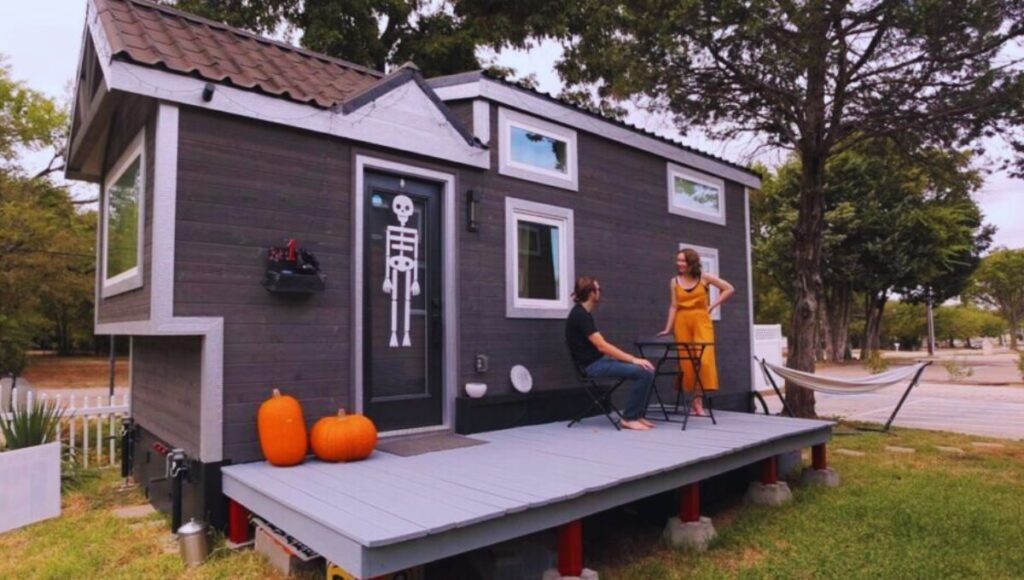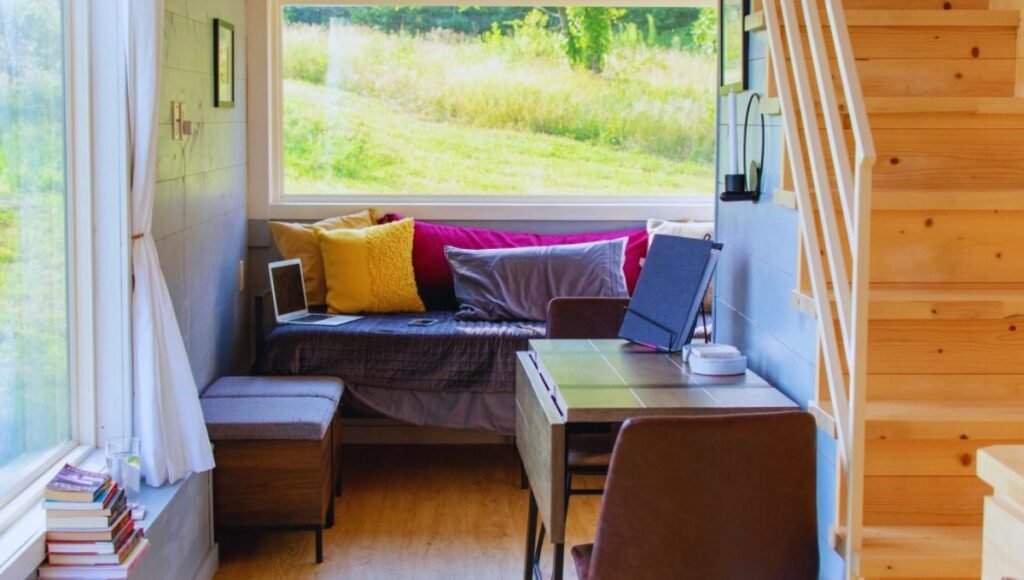Buying a tiny home in Houston might just be the most complicated endeavor you’ll ever undertake. Before you even think about purchasing, you need to navigate a labyrinth of local zoning laws to avoid fines and legal headaches. Determining a realistic budget, including hidden costs, is also important. But that’s just the beginning. You’ll want to explore various financing options, choose a reputable builder, and make sure the land you pick is suitable for utilities. Curious about which steps you should prioritize to make this process smoother? Let’s explore these essential tips in more detail.
Key Takeaways
- Verify Houston zoning laws to ensure your tiny home complies with local regulations and avoid potential legal issues.
- Determine a realistic budget, including down payment, utilities, maintenance, and potential cost overruns for affordability.
- Explore various financing options, such as FHA loans, personal loans, and local bank loans, to find the best terms for your situation.
- Choose a reputable builder with stellar reviews and verified credentials to ensure quality and reliability.
- Find suitable land with necessary utility connections and check for compliance with zoning laws and permit requirements.
Research Local Zoning Laws

Before you even think about buying a tiny home in Houston, make sure to research the local zoning laws to confirm that your plans comply with city regulations. Houston’s zoning restrictions can vary greatly depending on the neighborhood, and understanding these rules is essential.
You don’t want to invest in a home only to find out it can’t be legally placed on your desired lot. Familiarize yourself with permit requirements, as these can also differ based on the type and size of your tiny home. Obtaining the proper permits not only guarantees you’re adhering to the law but also protects you from potential fines and legal issues.
Do your homework now to save headaches later.
Determine Your Budget
Once you’ve navigated Houston’s zoning laws, it’s time to determine your budget to guarantee you can afford not just the tiny home itself, but also the related expenses. Start by identifying how much you can allocate for the down payment. Typically, you’ll need at least 20%, but this varies.

Next, factor in potential cost overruns—unexpected expenses like construction delays or material price increases can quickly inflate your budget. Be realistic about ongoing costs such as utilities, insurance, and maintenance.
Explore Financing Options
When exploring financing options for your tiny home in Houston, look into loan programs specifically designed for small dwellings. These programs can offer favorable terms that align with your budgetary constraints.
Loan Programs Available
Securing the right loan program is essential to making your tiny home dream in Houston a reality.
First, evaluate your loan eligibility by examining your credit score, income, and debt-to-income ratio. These factors directly impact the interest rates you’ll be offered.
Federal Housing Administration (FHA) loans are a popular choice due to their flexible eligibility criteria and competitive rates.
Alternatively, consider personal loans or RV loans, which can be easier to qualify for but may come with higher interest rates.
Credit unions and local banks often offer tailored financing options for tiny homes, so don’t overlook them.
Budgeting for Tiny Homes
Developing a thorough budget for your tiny home is essential, as it guarantees you can explore and secure the best financing options available. Start with detailed cost analysis to understand the full scope of your financial commitment. Break down expenses such as land acquisition, construction, utilities, and permits.
Next, implement strict expense tracking to monitor your spending throughout the project. This helps you identify any potential overruns early on. Research various financing options, including personal loans, RV loans, and specialized tiny home lenders. Each has different interest rates and terms, so choose the one that aligns with your financial situation.
Choose the Right Builder
Finding the right builder is essential to ensuring your tiny home in Houston meets your expectations and needs. Start by researching builder reviews to gauge reliability and craftsmanship. Check if they offer customization options that align with your vision. Compare builders on various criteria to make an informed decision.
| Criteria | Builder A | Builder B |
|---|---|---|
| Customer Reviews | ⭐⭐⭐⭐⭐ | ⭐⭐⭐⭐ |
| Customization Options | Extensive | Limited |
| Price Range | $$ | $$$ |
| Warranty | 5 years | 3 years |
Opt for builders with stellar reviews and extensive customization options. Verify their credentials and past projects. Don’t rush; selecting a reputable builder can make or break your tiny home experience.
Find Suitable Land
When you’re looking for land for your tiny home in Houston, start by checking zoning laws and required permits to guarantee compliance.
Don’t overlook the importance of utility connections; having access to water, electricity, and sewage can save you a lot of hassle and expense later.
Zoning and Permits
Understanding Houston’s zoning laws and securing the necessary permits is vital to finding the perfect plot for your tiny home. You’ll need to guarantee zoning compliance to avoid any legal issues down the line.
Houston’s zoning laws can be complex, so it’s essential to research which areas are designated for residential use and if tiny homes are permitted. Permit costs can vary, and it’s important to budget for these expenses upfront. Contact the city’s permitting office to get a detailed breakdown of the fees involved and the documentation you’ll need.
Utility Connections
Securing utility connections for your tiny home in Houston requires careful planning and evaluation of the available infrastructure on the land you choose. Start by contacting local utility providers to understand the availability and requirements for water, electricity, and sewage services.
It’s important to inquire about connection fees, as these can greatly impact your overall budget. Evaluate if the land has existing hookups or if you’ll need to install new connections, which can be costly and time-consuming.
Don’t forget to check for high-speed internet options, especially if you work from home. By addressing these factors early, you can avoid unexpected expenses and ensure your tiny home is comfortable and fully functional from day one.
Consider Utility Connections
Securing reliable utility connections for your tiny home is crucial for comfortable living in Houston. Start by evaluating the water supply. Does the property have access to a municipal water line, or will you need a well? Reliable water access can have a substantial impact on your daily life and maintenance routines.
Next, consider the sewage systems. Connecting to the city’s sewage infrastructure might be straightforward in urban areas, but rural locations may require septic systems. Assess the costs and logistics involved in each option.
Don’t forget about electricity, gas, and internet. Verify that these services are readily available and can support your lifestyle. Proper utility connections ensure your tiny home isn’t just livable but also enjoyable.
Plan for Storage Solutions
Once you’ve assessed your utility needs, it’s time to think creatively about storage solutions to make the most of your tiny home’s limited space. Start by investing in multi-functional furniture. Consider a bed with built-in drawers or a coffee table that doubles as a storage chest. These pieces maximize functionality without sacrificing style.
Next, make use of vertical storage to keep your floor space clear. Install shelves or cabinets up to the ceiling, and use hanging organizers for items like kitchen utensils and toiletries.
Don’t overlook underutilized areas, such as the space under stairs or above door frames. By strategically planning your storage solutions, you’ll guarantee your tiny home remains organized and clutter-free, enhancing both your comfort and living experience.
Conclusion
To sum up, purchasing a tiny home in Houston requires careful planning and diligence. By researching zoning laws, setting a realistic budget, exploring financing, and choosing a reputable builder, you can avoid potential pitfalls.
Finding suitable land and considering utility connections guarantees your tiny home is both legal and livable. Don’t let the details overwhelm you; with the right approach, your dream tiny home is closer than you think.
After all, preparation is the key to a seamless tiny home journey.